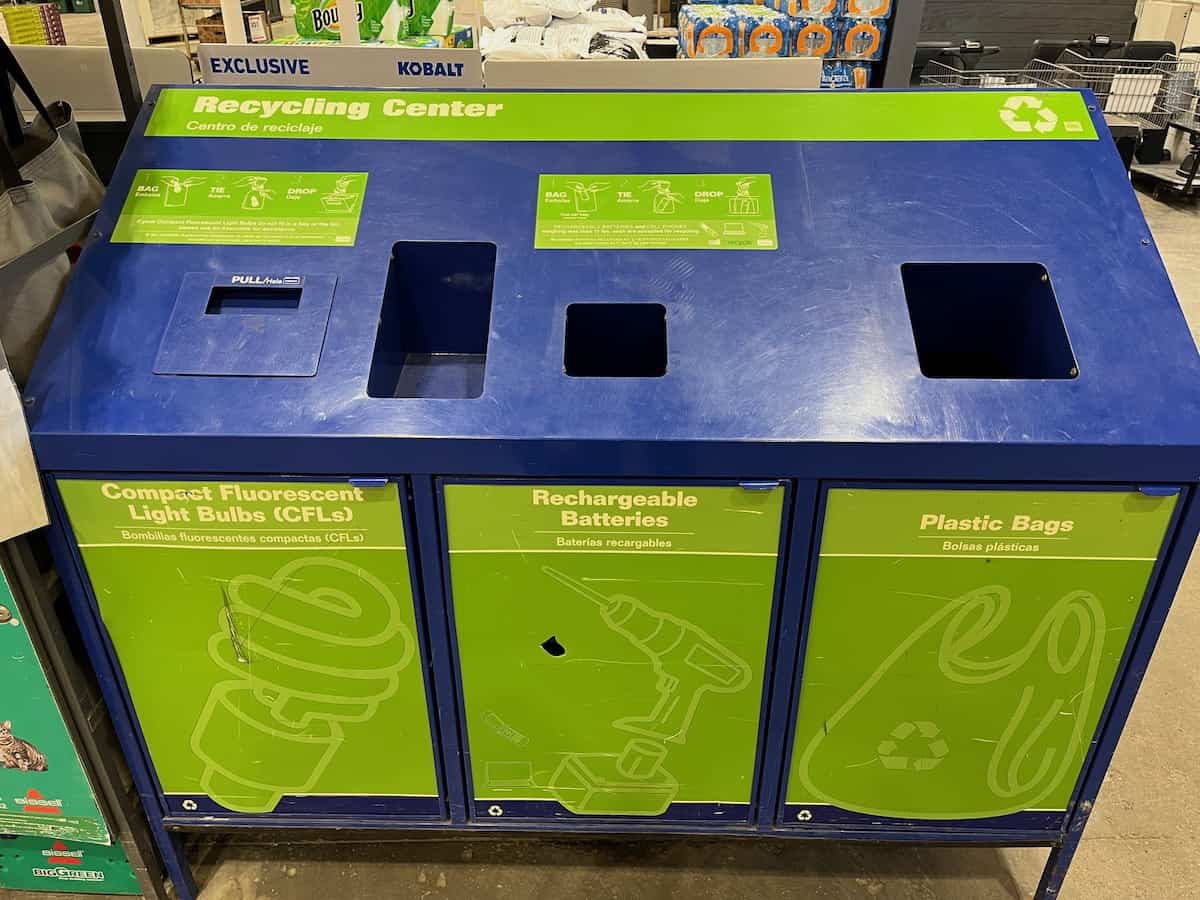How Long Does It Take to Decompose
What would you say if I told you that there are things in your home that could take centuries or even longer to decompose in the trash? As Earth Day approaches or even at any time during the year, it’s something to consider. And that is what you throw out and how long it takes for that item to decompose.
For instance, once you throw something away, you think that it’s out of your life forever. Which, technically it is.
However, that item’s journey to decomposition has just begun. Organic materials, like that leftover salad someone couldn’t quite finish, can return to the earth in a matter of days, especially if you compost your food scraps.
On the other hand, the plastic container that the salad came in could take thousands of years to decompose in a landfill, if you don’t recycle it.
How long it takes something to decompose
It’s important to note that many variables affect how long it takes something to decompose. For example, decomposition rates can vary dramatically based on factors like temperature, moisture, exposure to sunlight and the elements, the presence or lack of microorganisms, and whether the object is buried or exposed.
Similarly, not all items—plastic bottles, for example—are made in the same way or with the same materials. Therefore, they’re likely to have varied decomposition rates. But just the fact that 14 million tons of plastic trash end up in oceans each year, this is an important topic to discuss.
Stacker looked at how long it takes for some common things that people throw away to decompose.
Plastic bags take 10–1,000 years to decompose

Gansstock // Shutterstock
With a decomposition timeline of up to a millennia (that’s 1,000 years), no wonder so many states have started to ban single-use plastic bags. Sure, some plastic bags may break down in landfills as soon as a decade from now, but why take the risk and throw them out?
Instead, consider bringing your own bags to the store, especially if you live in a state that charges you for single-use bags. Even better, educate yourself on stores that recycle plastic bags along with other plastic containers.
Plastic straws
Americans use millions of straws daily, and they end up in the trash. So, it’s a bit disconcerting to learn that straws can remain on the earth for two centuries after being tossed in the garbage.
It’s one of the reasons our family has invested in reusable plastic straws. They can go in the dishwasher and last for years.
There’s also the option of stainless steel straws, but for some reason they hurt my teeth. Therefore, I stick with the reusable plastic straws that I got on Amazon. That’s my collection in the picture below.
Photo by Leah Ingram
Wet wipes

siam.pukkato // Shutterstock
I’m guilty of grabbing a wet wipe for a quick and easy way to clean up. This could be for removing makeup or cleaning my Peloton bike.
However, I’m going to rethink all of that, now that I’ve learned that wipes are made with a polyester-based plastic that’s virtually indestructible. In fact, they take a century to break down after they’re tossed in the garbage or flushed down the toilet.
If you’d like to make a small change to break your makeup wipe habit, may I suggest the Makeup Eraser? It’s a reusable, machine-washable cloth that takes off makeup as well as those disposable wipes do. Right now you can use the coupon promo code BYEBYEWIPES to save 30% on your purchase.
Also, this page on the Makeup Eraser website has more information about how destructive wipes can be to the environment. It’s a bit sobering.
Chip bags and candy wrappers

Adobe Photos
According to Climate of Our Future, most food wrappers, including chip bags and candy wrappers, can take as long as 100 years to decompose. Here’s a better way to dispose of them: engage Terracycle.
You can purchase a Terracycle Zero Waste box so that you’ll never need to throw away chip bags, candy wrappers, K cups or anything else that you can’t recycle with your curbside trash and recycling service. Instead, you’ll fill the Terracycle Zero Waste box and then send it back to Terracycle for free.
I was so surprised to see Terracycle recycling boxes at my local Subaru dealership, shown below. Can you see all of the items these Terracycle boxes could recycle? Besides snack wrappers, they could also take creamer cups, coffee pods and coffee cup tops.
Photo by Leah Ingram
Plastic bottles take 450 years to decompose
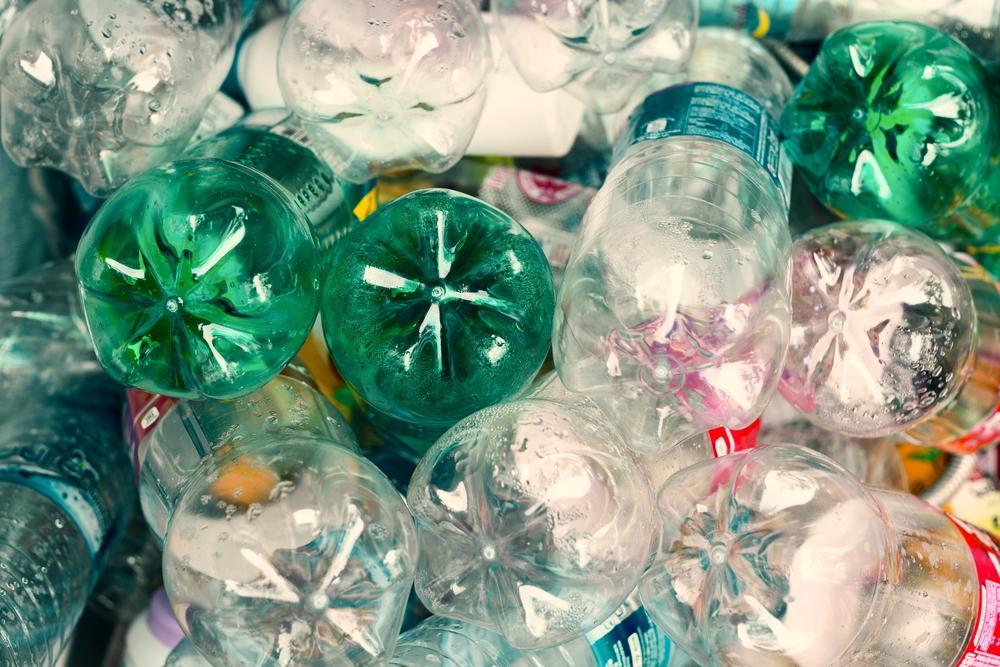
Teerasak Ladnongkhun // Shutterstock
Plastic bottles are one of the easiest items to recycle. Plus, in some states you can get money for plastic bottles, such as through the Clynk program at Hannaford.
So, it’s a real headscratcher why Americans throw away more than 60 million bottles every day. Not every year–every day.
Here are common recycling mistakes people make.
Plastic bottles take hundreds of years to decompose. So, if you’re not going to make the effort to recycle them, then at least make the effort to start drinking from reusable bottles and cups. I love my Tervis Tumblers!
Cotton T-shirts
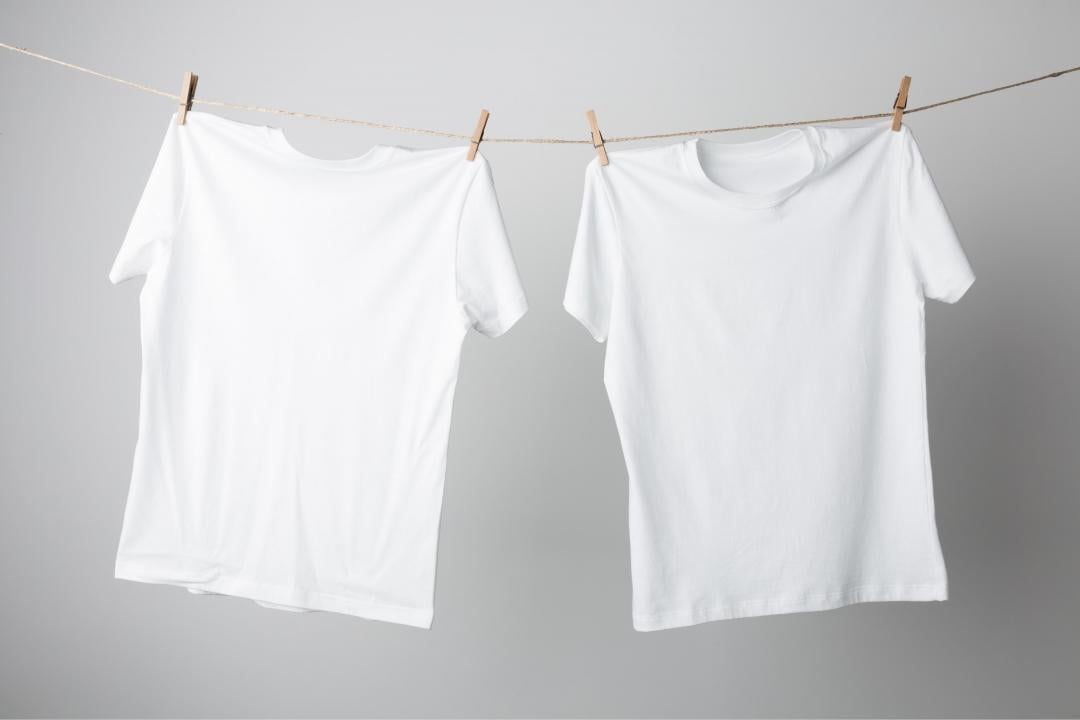
SQS // Shutterstock
When you learn that cotton t-shirts can decompose in six months, that doesn’t sound so bad, right? Well, why throw away something that you could reuse or repurpose or even donate?
In our house, worn-out t-shirts get turned into rags. On the other hand, if you have t-shirt you no longer want, you can always do a clothing swap, donate them to Goodwill, or if they’re brand name, sell them back to a brand that will resell them.
Speaking of cotton, you can also recycle denim and jeans. No need to throw them out either.
Synthetic fabrics take over 100 years to decompose

The vast majority of fashion waste can be donated or repurposed into things like dog beds or cleaning rags instead of being thrown in the garbage. Even men’s neckties can find a new life in a high school’s theater department’s costume shop.
Aluminum cans: 80–100 years
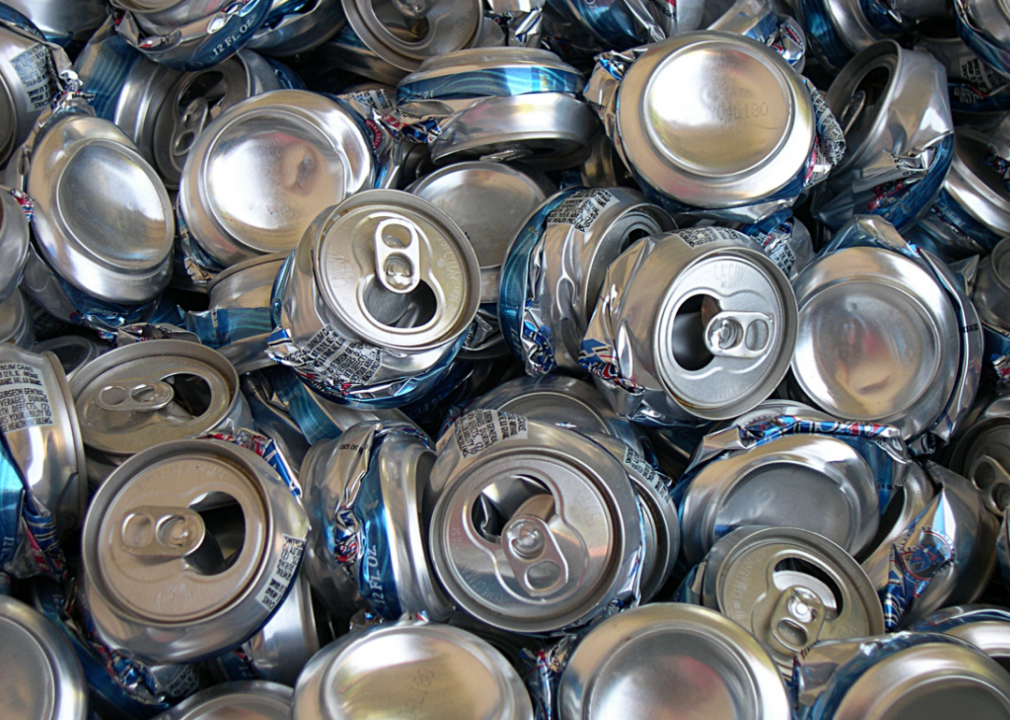
Like the plastic bottles mentioned above, there is no reason not to recycle aluminum cans. Cans are one of the most widely accepted items in curbside recycling programs.
Also, did you know that aluminum is able to be recycled an unlimited number of times, making it one of the most critical and widely repurposed recyclables. Plus, in some states, you can get up to 10 cents back for a soda can.
Food scraps
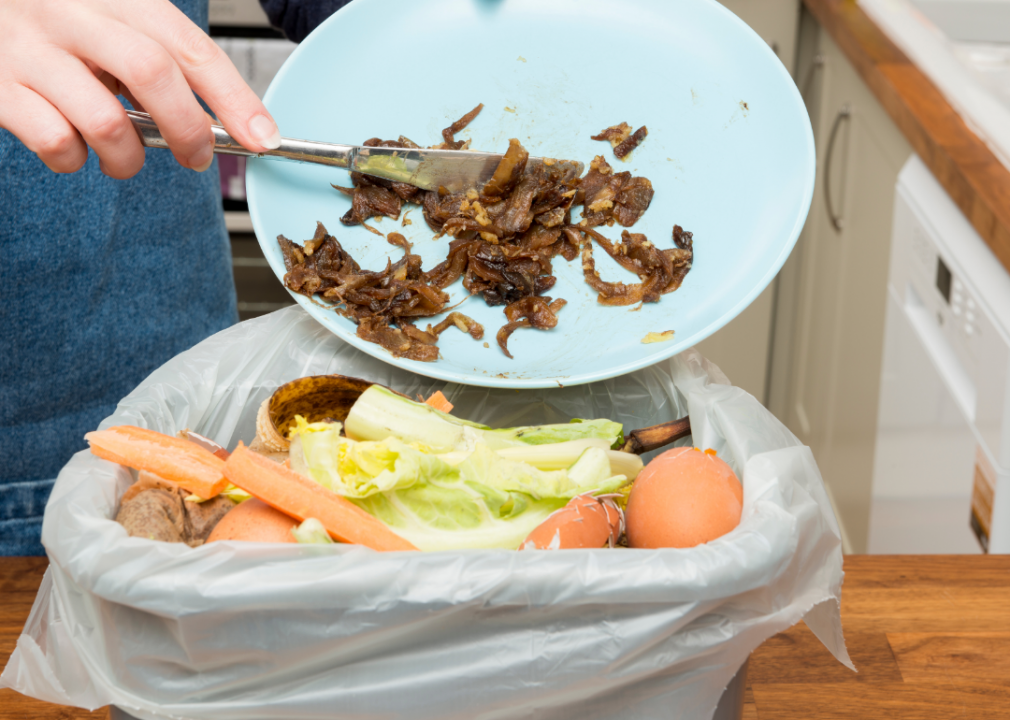
I grew up in a household that composted its food scraps. In fact, one of my childhood chores was emptying the compost bucket.
So, I guess it’s no surprise that I grew up to become an adult who composts her food scraps, too. This is a picture of the spinning recycling bin I bought on Amazon. I’ve even seen a version at Aldi.
Photo by Leah Ingram
Anyway, why compost? Because we Americans waste 40% of all the food we purchase every year. That adds up to approximately 119 million tons of food that is worth more than $400 billion.
As far as how long it takes food scraps and waste to decompose, it depends. So, I’ve created a bulleted list to lay out the varying decomposition times for different foods.
- Vegetables: Five days to one month
- Orange peels: six months
- Banana peels: up to six months
- Egg shells: one year or more (crush them first before composting)
- Apple cores: two months
- Bread: two to three weeks
- General food scraps: a few months
Hairspray bottles

Aerosol bottles, like the kind that contain hairspray, are a common sight in landfills across the world. It’s kind of mindblowing that a single hairspray bottle could still be intact in a landfill 500 years from now. That’s not hyperbole–it can take that long for that container to decompose.
However, they don’t have to end up in landfills. Most aerosol bottles or spray cans are made from either aluminum or steel. That means that they can go in curbside recycling.
Thread

Thread is everywhere. Thankfully, it takes only a few months to decompose. Best of all, you can compost thread. So, no need to throw it out.
On the other hand, if you have tons of thread you have no use for anymore, then donate it or give it away in a Buy Nothing group.
Paper

Paper waste takes only about a month—or a few weeks, give or take—to break down in landfills, but the problem is volume and quantity. Even though it’s one of the most commonly recycled materials, paper waste takes up more space in landfills than most other products.
So, in case you didn’t know, paper is compostable. In fact, I’ll take the remnants from my paper shredder and put them in my compost bin. There is no reason to throw away paper. At the very least, please recycle it.
Shoes and boots

Leather shoes take a quarter-century or more to decompose. On the other hand, rubber-soled boots can take a half century to decompose.
So, the best solution? Donate old shoes or have existing shoes resoled so you can get more life out of them.
If you happen to have Timberland boots you’re looking to get rid of, did you know about the Timberloop resale program? It is designed to close the waste stream loop.
You take your Timberland boots back to a store or mail them in. Then, Timberland fixes them up and resells them on their Timberland Timberloop resale site. In return for sending back your used Timberland boots, you’ll get a 20% off Timberland coupon for future shopping.
Cardboard

How long does it take for cardboard to decompose? About two months. That’s why it’s great to put in your compost or use as garden mulch.
On the other hand, you can repurpose cardboard for crafts, packing a home, shipping packages or storing things.
Paper towels

It doesn’t take very long for paper towels to decompose–between two and four weeks. It’s why I put used paper towels in the compost, assuming they don’t have grease on them.
We Americans love our paper towel. In the U.S. alone, we throw out more than 13 billion pounds of paper towels each year. Want to reduce that waste number? Switch to reusable cloth towels like we have. That’s my drawer full of them.
Egg cartons
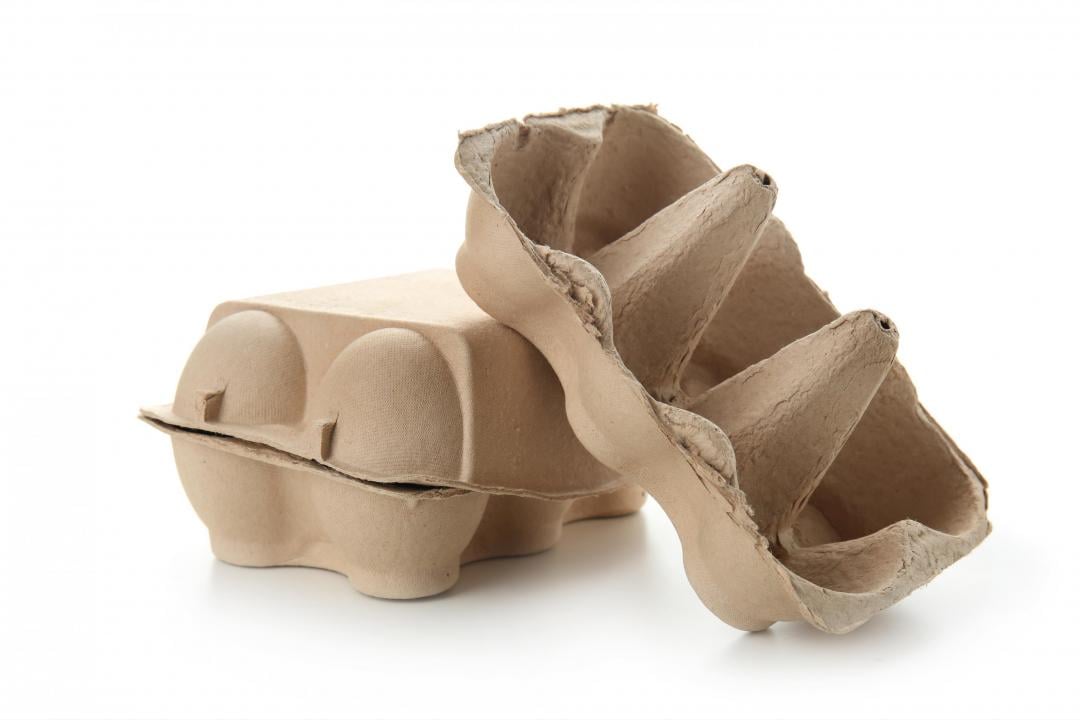
Aquarius Studio // Shutterstock
If you’re getting your eggs in brown cardboard cartons like those above, then you can recycle them. Or, you can do what I do and compost them. That is, I’ll break them up into smaller pieces and put them in my compost pile. Also, if you have a farm nearby that sells eggs, you can always donate old cartons to them.
Sometimes eggs come packaged in clear plastic cartons. Those are recyclable, too. The only egg carton that is not recyclable is the styrofoam kind. And unfortunately those will live forever in landfills as they don’t break down organically.
Disposable diapers: 500 years

Laboko // Shutterstock
Disposable diapers can’t be recycled for obvious reasons. That’s why diapers are the third most common consumer item you’ll find in landfills. It doesn’t help that the average baby goes through up to 10,000 diapers before being potty trained. Yeah, I remember those days.
Rubber bands

You don’t have to feel tremendous guilt if you throw away rubber bands. They tend to decay pretty quickly and are almost completely decomposed within a year.
Lumber and plywood

Addoro // Shutterstock
Lumber is heavy and solid, and can take more than a decade to break down. Plywood breaks down faster–just a few years. However, why contribute to the landfill? If you have leftover lumber or plywood from a home improvement project, then donate it to your local Habitat for Humanity ReStore.
Batteries
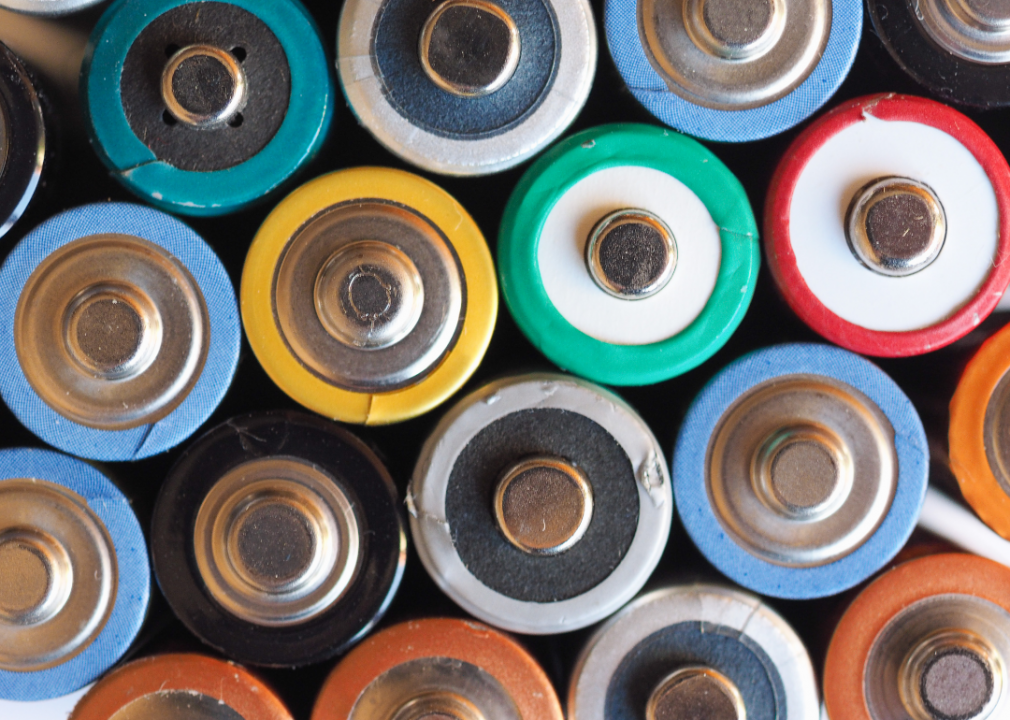
Common household alkaline batteries are safe to throw away. However, rechargeable batteries aka lithium batteries, car batteries, and other industrial types must be disposed of according to federal guidelines.
On the other hand, you can bring your used batteries to stores that take them for safe recycling. For example, home improvement stores like Lowe’s and Home Depot often have battery recycling bins near the customer service desk.
In fact, I took this picture at my local Lowe’s. It shows that you can bring rechargeable batteries back to Lowe’s to be recycled.
Photo by Leah Ingram
Printer cartridges

Never ever throw away ink cartridges from printers. Not only do they take centuries to decompose, but they also leak toxic chemicals as they break down.
Instead, dispose of ink cartridges at stores like Staples or Target, which can recycle them safely. Some companies, like Hewlett-Packard, provide postage-paid labels so you can send ink or toner printer cartridges back to them for recycling or safe disposal.
Plastic bottle caps
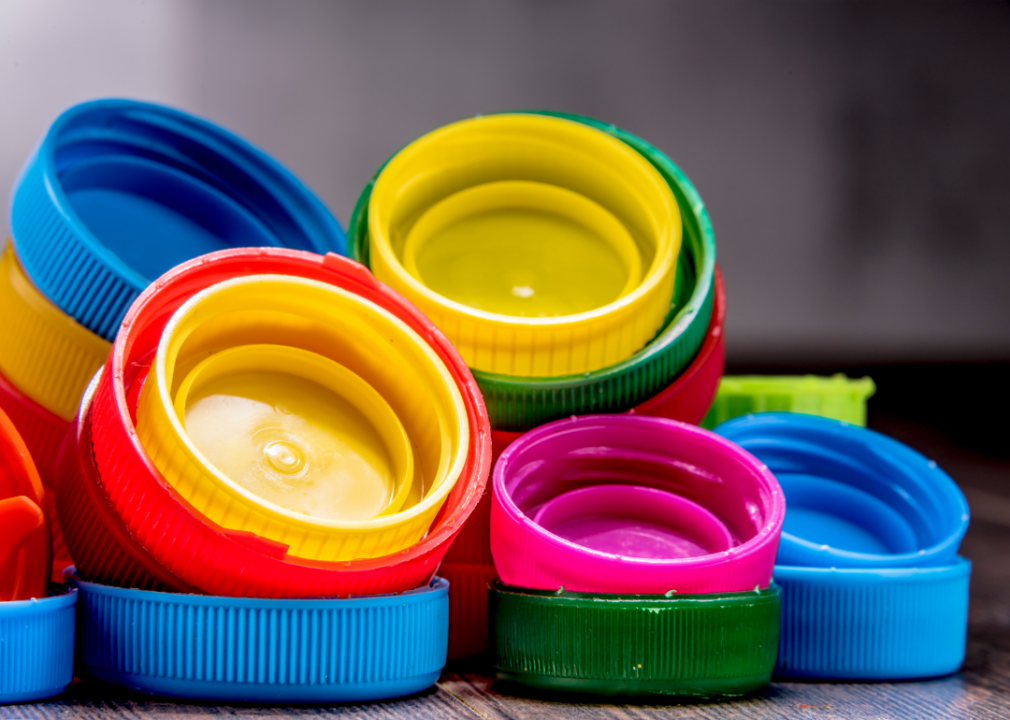
Bottle caps previously had to be separated from plastic bottles before they could be recycled, as caps and bottles are made from two different types of plastic. Now, with single-stream recycling, that’s no longer true. So there’s no reason to leave bottle caps in the trash, where they’ll take years to decompose–possibly as long as 500 years.
Aluminum foil
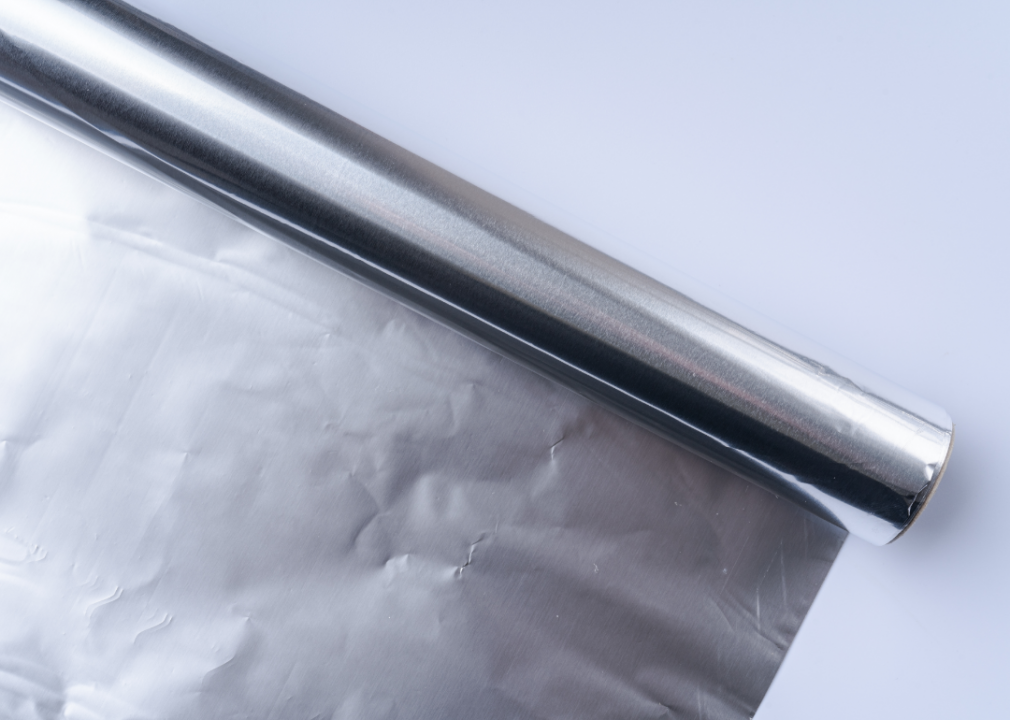
Believe it or not, aluminum foil never decomposes. However, many Americans don’t realize that it is easily and completely recyclable.
Styrofoam: never
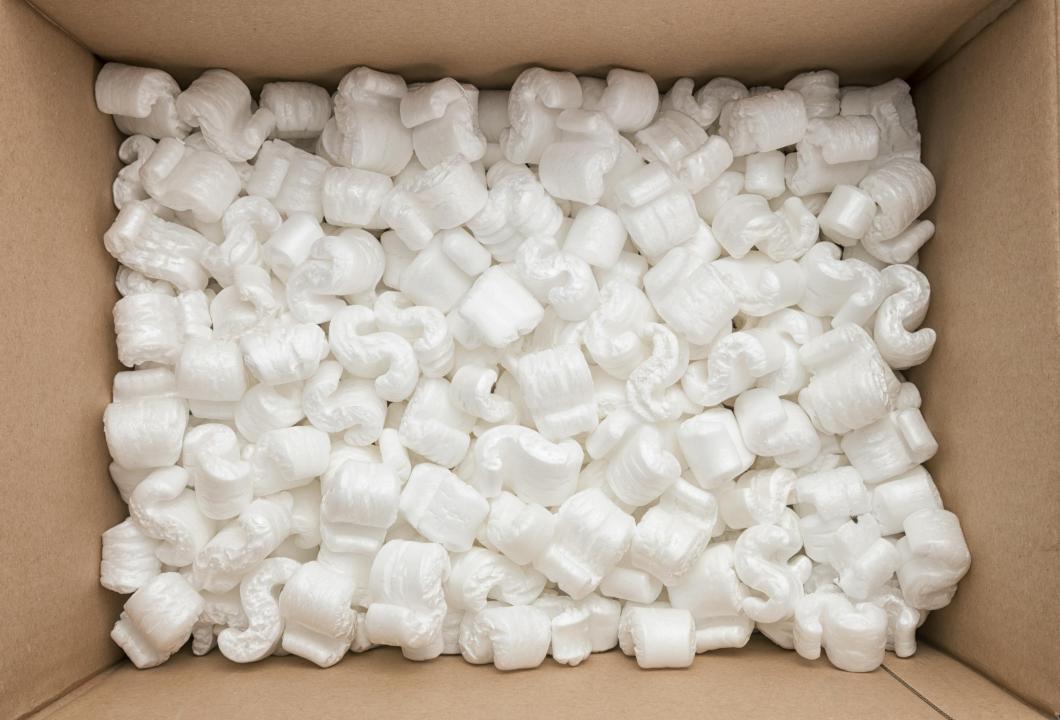
r.classen // Shutterstock
Styrofoam is another never decomposing product. Yet, packing peanuts like those above are everywhere. Styrofoam is efficient and inexpensive, but making it requires the use of fossil fuels and dangerous chemicals. Plus, virtually no communities allow it to be included in recycling. Finally, it is not biodegradable, so it never decomposes.
So, just say no to styrofoam of all kinds. And if you do end up with packing peanuts, see if your local UPS Store or FedEx/Kinko’s store will take them back. If they can’t recycle them, they’re likely to reuse them.
Andrew Lisa contributed to this article, which originally appeared on Stacker.com.
The post How Long Does It Take to Decompose appeared first on Real Sophisticated Consumer.





